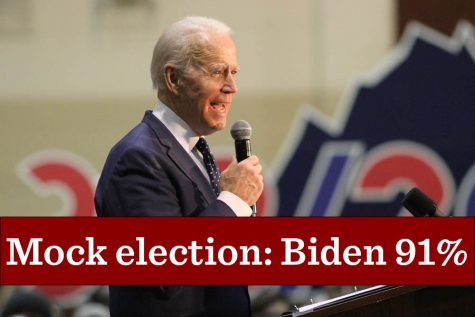Many arguments in favor of, against gun control
February 16, 2021
What are the different sides of the argument?
People in favor of additional gun control have three main arguments: efficiency of anti-gun laws in other countries, the shifting context of the Second Amendment and that current systems are not restrictive or cautious enough.
Those in favor of additional gun control argue that countries with restrictive gun control laws have lower gun homicide and suicide rates than the United States, as stated in an article on the global impact of gun violence by Gun Policy. Compared to the United States, Switzerland, for example, has remarkably strict gun laws and requirements, and had around 14 times fewer homicides per 100,000 people in 2009.
According to Harold Pollack, the co-founder of the University of Chicago Crime Lab who supports gun control, current gun laws in most states do not take mental health into consideration.

“Another issue comes in for suicidal people when the barriers are really low to get a hold of a handgun. And this mental health angle is really important, because when people are dangerous to themselves, it really demands better and more holistic public policies,” Dr. Pollack said.
Secondly, 51% of the American population argue that the Second Amendment is outdated, and that it is more important to control gun ownership than to protect the right to own guns. There are several ways that gun-control advocates believe that gun control can be enforced. In fact, proponents of gun control argue that the United States already has the right laws in place — they simply need to be strengthened or better enforced. According to an NBC News-Wall Street Journal survey, an overwhelming majority of 89% of respondents believe that background checks and restrictions need to become stricter.
Some even argue that particularly deadly guns need to be abolished as a whole. According to Dr. Pollack, some guns are rarely used in self-defense but instead used to commit high-level crime such as mass shootings.
“I definitely agree that we should create a much, much stricter regulation for some of the semi-automatic rifles and some of the large-capacity magazines and things of the sort because you don’t need those for self-defense, and those are what end up being used for mass shootings,” Dr. Pollack said.
I definitely agree that we should create a much, much stricter regulation for some of the semi-automatic rifles and some of the large-capacity magazines.
— Harold Pollack
Gun control opponents have three main arguments as well. According to Dr. Pollack, one argument often used against gun control is that the Constitution’s Second Amendment is an inherent aspect of American tradition and culture, and some believe that stricter gun control laws would infringe upon this basic right to own a gun that they believe is essential to maintain individual liberty.
Supreme Court Justice Antonin Scalia wrote in the 2008 case of District of Columbia v. Heller, “The Second Amendment protects an individual right to possess a firearm unconnected with service in a militia, and to use that arm for traditionally lawful purposes, such as self-defense within the home.” The landmark decision of the Supreme Court for this case granted the individual right to bear arms, not just for militia but also for self defence – a victory for gun owners and advocates.
Another argument is that gun control laws do not prevent criminals from obtaining guns or breaking laws. More specifically, as stated by guns rights activist John R. Lott, gun control laws take away guns from law-abiding citizens, while criminals would simply ignore these laws, leading to an increase in the number of illegally possessed guns compared to legally possessed guns.
Lastly, another major argument used is that rather than gun control, education about guns and gun safety is needed. As stated in a paper compiled by the Sporting Arms and Ammunition Manufacturers’ Institute, a trade association of manufacturers of guns, ammunition and components, a knowledgeable gun owner is rarely involved in a firearms accident of any kind.
The public’s opinion and the state of gun control today
Today, the average age to purchase a gun in the United States is 18. Furthermore, federal law prohibits certain people from owning firearms — people with certain types of criminal records or mental illness, drug addicts, or undocumented immigrants.
- 51% of the American population argue that the Second Amendment is outdated.
- 89% of Americans believe that background checks and restrictions need to become stricter.
- The average age to purchase a gun in the United States is 18.
- In 2018, mass shootings made up for 0.2% of total deaths from firearms.
- 47% of men interviewed in jails and prisons had been shot.
According to Dr. Pollack, the system has far too many holes in it for it to be effective.
“I think we do have a lot of laws that need to be aggressively enforced. Most gun crime is committed by people who do not have a legal right to have the gun that they’re using,” Dr. Pollack said, “and if we enforce existing laws more effectively, we could accomplish a lot.”
A 2015 New York Times article on an overview of gun control today said the restrictions in place for those with mental illnesses are ineffective. The system only restricts people determined as a mentally defective by a court or other authority, yet most people with even severe mental illnesses almost never receive such a characterization in their lifetime.
According to the same article, surveys that broadly ask whether people want to see stricter gun laws have almost evenly divided results. However, when questions are asked about specific gun restrictions, the results are much more pro-control.
As a high school student, I think it’s impossible not to worry about being in a school shooting in our country today.
— Kiran Renuka
When it comes to high schoolers, one of the most prominent fears is high school shootings. According to sophomore Kiran Renuka, they’re definitely one of her larger fears in regards to crime.
“As a high school student, I think it’s impossible not to worry about being in a school shooting in our country today. I mean, we’re having to do things like lockdown drills just in case, and school shootings have become more frequent,” Kiran said. “There needs to be better mental health support for students, and those students who are struggling should not be able to go out and buy a gun.”
Mass shootings vs. individual shootings
Another aspect of gun control that is the attention given to mass shootings in comparison to that given to individual shootings. While mass shootings gain far more attention than individual shootings, they make up a small percentage of overall shooting deaths. According to data put together by the CDC, in 2018 mass shootings made up for only 0.2% of total deaths from firearms.
Dr. Pollack believes mass shootings are certainly important to give attention to, especially since the media coverage it receives usually pushes for activism and change that help support gun control as a whole.
“It is certainly true that the dramatic mass homicides and mass shooting events are not typical of most gun violence. The kind of rampage shootings that make the front page are unusual, and they’re different from most of the gun violence that we see,” Dr. Pollack said. “I definitely do think that that’s a distinctive problem for which I believe getting better control over certain kinds of weaponry that facilitate mass shootings would be helpful.”
We have to get a better handle on a lot of the weapons that are not super common in mass homicide, but that are regular handguns used to commit shootings.
— Harold Pollack
Dr. Pollack believes a lot more can be done to decrease individual shooting rates outside of what the media can do. He argues that it’s vital that the ATF gets a grip over handguns used to commit these shootings.
“We have to get a better handle on a lot of the weapons that are not super common in mass homicide, but that are regular handguns used to commit shootings. Just because a weapon is not particularly used in mass homicides in a way that is publicly salient, doesn’t mean it’s not causing a lot of deaths. So we need to get a better handle on public attention to a broader range of weapons,” Dr. Pollack said.
Why is additional gun control so difficult to enact, and what needs to happen now?
Organizations and activists, such as Everytown for Gun Safety and Coalition to Stop Gun Violence, have spent decades trying to promote gun control in the United States, but the shooting rates prove that little seems to have changed. According to Dr. Pollack, a reason as to why gun violence isn’t decreasing can be seen in the self-perpetuating cycle in Chicago.
“I found that 47% of the men that we interviewed in jails and prisons had actually been shot and wounded by gunfire. And if you were to ask why they carry a gun, they’ll always say ‘Why do you think? I’d rather be judged by 12 than carried by six,’” Mr. Pollack said, citing references to the 12 members of a jury and six pallbearers at a funeral. “I have a lot of sympathy for many of the young people in Chicago who are armed, because they’re just trying to protect themselves from each other,” Mr. Pollack said.
Furthermore, Dr. Pollack believes another reason gun control is hard to enforce is because guns are an inherent part of American culture.
“We do have to find a way to talk across some polarized lines about how to regulate guns in a way that would gain broad public support,” Dr. Pollack said.
Dr. Pollack believes that this compromise can be conducted through strengthening the gun laws tightly rather than abolishing guns in our country as a whole. Once it’s recognized how important this compromise is, our country can begin to make progress.

